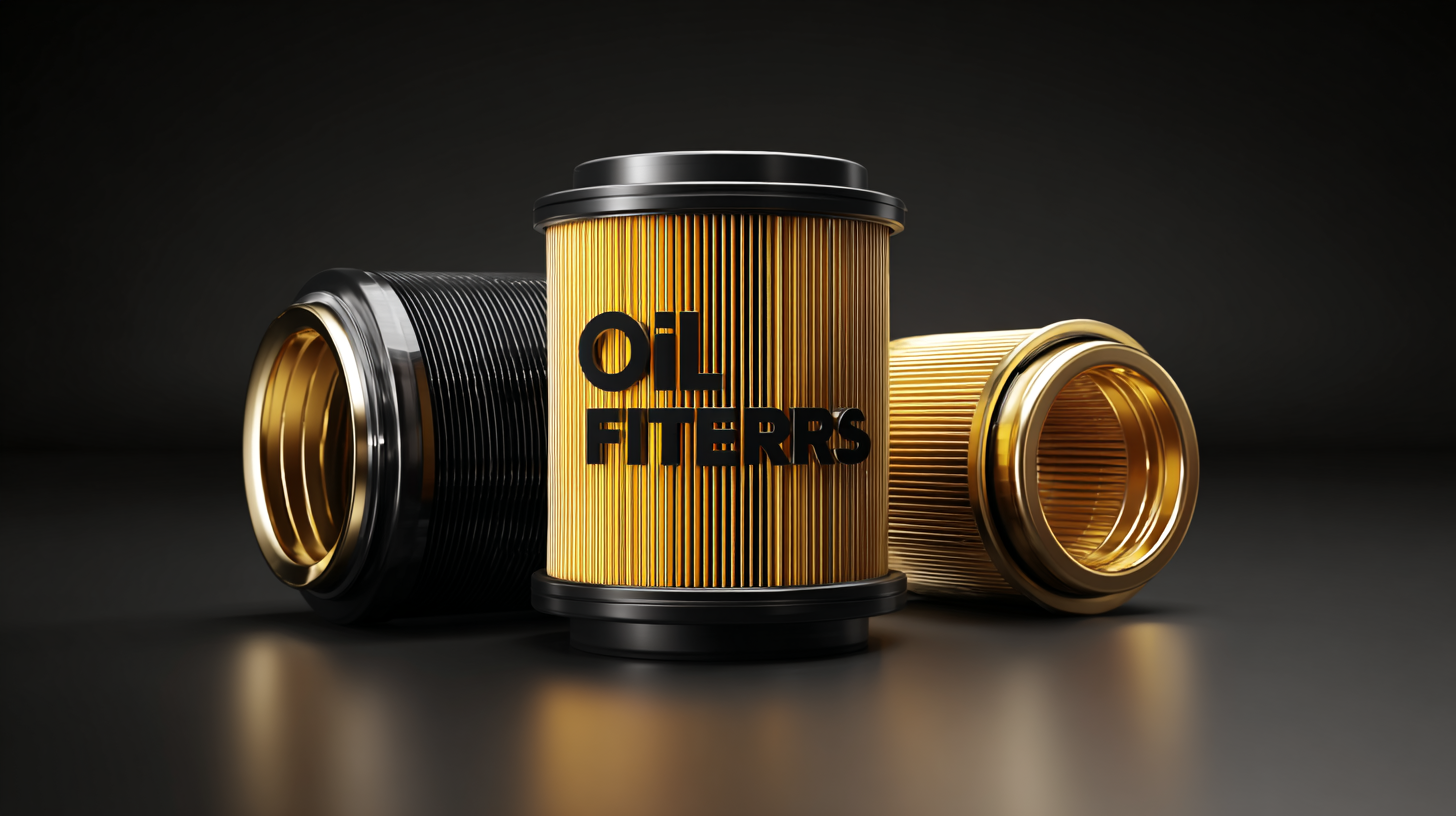
Discover the Top Examples of Best Oil Filters with Proven Performance Metrics for Global Buyers
When it comes to maintaining the performance and longevity of your vehicle, one of the most crucial components to consider is the oil filter. Oil filters play a significant role in preserving engine health by effectively removing impurities and contaminants from the engine oil.

In this blog, we will explore the top examples of the best oil filters that not only meet but exceed performance metrics recognized by global buyers. By understanding the benchmarks of quality and efficiency, you can make informed decisions that enhance your vehicle's reliability and engine performance.
Whether you are a novice car owner or an experienced mechanic, our insights and tips will guide you in selecting oil filters that deliver proven results and contribute to a Smoother Driving Experience. Join us as we delve into the world of oil filtration and uncover the options that can help your engine run at its best.
Top 5 Oil Filters for Superior Engine Protection and Longevity
When it comes to maintaining optimal engine performance, selecting the right oil filter is crucial. The market is filled with various options, but for those seeking superior engine protection and longevity, a few standout products have proven their worth through extensive performance metrics. Understanding these products can significantly impact how well your engine operates and how long it lasts. By investing in top-ranked oil filters, vehicle owners can ensure better filtration, enhanced engine cleanliness, and an extended lifespan for their engines.
In addition to oil filters, air filters also play a vital role in overall engine health. There are numerous aftermarket air filters that outperform original equipment manufacturer (OEM) brands. These superior alternatives not only enhance engine performance but also extend the longevity of critical components. With the right combination of oil and air filters, drivers can achieve optimal vehicle efficiency, enjoy cleaner emissions, and reduce the frequency of maintenance, making a noticeable difference in the driving experience.
Key Performance Metrics to Evaluate the Best Oil Filters Available
When evaluating the best oil filters available on the market, it's crucial to focus on key performance metrics that define their efficacy. Factors such as filtration efficiency, dirt-holding capacity, and flow rate play pivotal roles in assessing how well an oil filter can protect an engine. According to a recent industry report by the Society of Automotive Engineers (SAE), high-quality oil filters can remove up to 99% of contaminants as small as 20 microns, significantly prolonging engine life and performance.

Another essential metric to consider is the filter's lifespan. Most premium oil filters are designed to withstand oil changes of up to 10,000 miles. A study conducted by the American Petroleum Institute (API) revealed that filters meeting their certification standards consistently outperformed standard filters, reducing engine wear and improving overall efficiency. When selecting an oil filter, opting for products that carry API certification can ensure you’re choosing a filter backed by rigorous testing and industry standards.
Tips:
1. Always check the manufacturer's specifications for your vehicle to select an oil filter that meets or exceeds OEM requirements.
2. Pay attention to filter media type; synthetic media often provides higher filtration efficiency compared to traditional cellulose filters.
3. Don't overlook the importance of a proper sealing mechanism, as quality filters with robust gaskets prevent leaks and ensure consistent oil flow.
Why Choosing the Right Oil Filter Matters for Engine Efficiency
Choosing the right oil filter is crucial for maintaining engine efficiency and longevity. An oil filter's primary role is to remove contaminants from the oil, which can accumulate over time. If these impurities are not properly filtered out, they can cause significant wear and tear on engine components, leading to reduced performance and potentially costly repairs. High-quality oil filters not only extend the life of your engine oil but also enhance the overall efficiency of your vehicle.
When selecting an oil filter, buyers should consider performance metrics such as filtration efficiency and dirt-holding capacity. Filters that perform well in these areas will ensure that your engine is supplied with clean oil, which is essential for its optimal functioning. Moreover, the right oil filter can contribute to better fuel economy by allowing the engine to operate smoothly. Investing in a proven, high-performance oil filter is an essential decision for any car owner looking to maximize engine performance and reliability.
Discover the Top Examples of Best Oil Filters with Proven Performance Metrics for Global Buyers - Why Choosing the Right Oil Filter Matters for Engine Efficiency
| Oil Filter Type | Filtration Efficiency (%) | Service Life (Miles) | Bypass Valve Type | Price Range ($) |
|---|---|---|---|---|
| Synthetic Fiber | 99 | 15,000 | Internal | 25-40 |
| Cellulose | 95 | 5,000 | Internal | 10-20 |
| Microglass | 98 | 20,000 | Internal | 30-50 |
| Composite | 90 | 10,000 | External | 15-30 |
| Aluminum | 96 | 12,000 | Internal | 20-35 |
Comparative Analysis of Popular Oil Filters Based on User Reviews
In 2023, the global oil filter market is valued at approximately $100.22 billion, with projections indicating a rise to $161.11 billion by 2032. This growth reflects the increasing importance of efficient filtration in automotive and industrial applications, particularly as users become more discerning in their choices. A comparative analysis based on user reviews reveals the top-performing oil filters, highlighting metrics such as filtering efficiency, durability, and cost-effectiveness.
When selecting an oil filter, consider the synthetic versus traditional options, as each type offers unique advantages. Synthetic filters tend to provide better filtration and longer service life, making them ideal for performance enthusiasts. Additionally, make sure to check user reviews and ratings, as firsthand experiences can guide your decision. Another tip is to align your filter choice with your specific vehicle requirements or operational needs, ensuring optimal compatibility and performance.
In a related development, the petrochemical sector anticipates significant growth, particularly in refined filtration technologies. Innovations, such as the newly patented paint sand prevention filter, showcase a trend towards specialized solutions designed to enhance filtration efficacy. This focus on advanced technology will likely drive the market further, catering to an increasingly diverse range of user requirements.
Comparison of Oil Filter Performance Metrics
Expert Recommendations: The Most Reliable Oil Filters for Global Buyers
When it comes to maintaining the health of your vehicle, selecting a high-quality oil filter is crucial. Experts recommend oil filters that not only provide exceptional filtration but also demonstrate reliability under various conditions. Brands such as Mobil 1 and K&N have garnered praise from automotive professionals for their robust construction and superior performance metrics.
 Mobil 1's Advanced Fuel Economy Oil Filter, for example, is designed to enhance engine efficiency while capturing harmful particles, ensuring that your engine runs smoothly over extended periods.
Mobil 1's Advanced Fuel Economy Oil Filter, for example, is designed to enhance engine efficiency while capturing harmful particles, ensuring that your engine runs smoothly over extended periods.
Another top contender is the Bosch Premium Oil Filter, which combines advanced filtration technology with a durable design. This filter is praised for its ability to capture and hold more dirt, extending the life of your engine and improving overall performance. Similarly, the Fram Extra Guard Oil Filter is frequently recommended for its affordability without compromising quality, making it a popular choice among global buyers seeking dependable options. These oil filters not only meet but often exceed industry standards, making them standout choices for anyone looking to protect their investment on the road.
